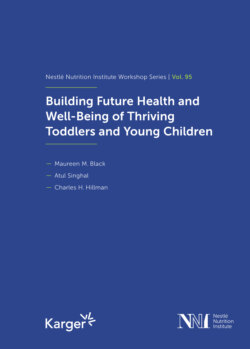Читать книгу Building Future Health and Well-Being of Thriving Toddlers and Young Children - Группа авторов - Страница 12
На сайте Литреса книга снята с продажи.
Abstract
ОглавлениеToddlerhood, the period from 12 to 36 months, represents striking changes in children’s development. Along with mastery of skills such as walking, talking, self-feeding, sleeping through the night, and bowel and bladder control, toddlers strive for autonomy as they learn to regulate their emotions. Toddlers’ increasing autonomy impacts feeding behavior and may increase or restrict their food exposures. Baby-led weaning, allowing infants to participate in the family meal by selecting food and feeding themselves, exposes children to the family diet. Food neophobia, a normal developmental phase whereby children reject novel foods, may limit children’s exposure to high-quality foods. Food preferences formed during toddler and preschool years often persist into adulthood, making toddlerhood an ideal time to help children build healthy habits. Toddlerhood can be both joyful and challenging as children acquire new skills and assert their autonomy. Effective parenting practices include providing age-appropriate structure and opportunities for toddlers, reading toddler’s signals, and responding promptly, appropriately, and with nurturance. Responsive parenting ensures that toddlers receive the guidance and nurturant care needed to develop healthy feeding behavior and emotional well-being.
© 2020 S. Karger AG, Basel
